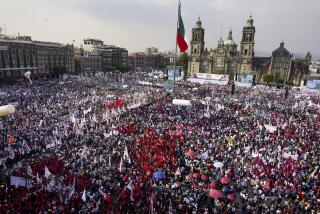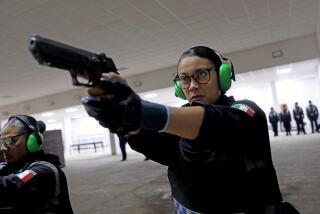Study Confirms Mexico City’s Crime Fears
- Share via
MEXICO CITY — A World Bank study of this crime-ridden capital underscores what many residents here know firsthand: that crime is 10 times worse than the government says it is and that the police are ineffectual in combating it.
Surveying half a dozen of Latin America’s most dangerous cities, the study--the first of its kind--sought links between economic problems and crime rates, according to the bank. Its authors found fertile ground in Mexico City, which saw a sharp rise in all kinds of crime--from killings to robberies to kidnappings--after the 1994 economic crisis and the joblessness and poverty that followed.
Disturbingly, crime has persisted and increased in the capital even though the economy has improved over the last several years, said World Bank economist and study co-author Daniel Lederman. Mexican states with the highest unemployment rates also have the most crime, he said.
The survey of 2,600 residents in Mexico City in 1999 found that nearly two in five had been victims of crime in the previous 12 months, more than 10 times the official crime rate, and that half the victims suffered physical injury during the crimes.
More than three-quarters of every Mexico City household had a family member who had been a crime victim during the previous year.
The statistics reinforce the common perception here that crime and danger lurk throughout Mexico. The country is experiencing a wave of kidnappings that led Gov. Felipe Gonzalez of Aguascalientes state to say Thursday that he would not oppose the death penalty for convicted kidnappers.
Another perception borne out in the study is that the police are “irrelevant” in the fight against crime, according to Lederman. A concentration of greater numbers of police in given neighborhoods of Mexico City has no impact on reducing crime, said co-author Renata Villoro Valdes, a professor at Iberoamericana University here.
Guadalupe Gonzalez, a political scientist specializing in organized crime at Mexico City’s Center for Economic Research and Teaching, said crime-stricken Mexico needs “not more but better police. The ones we have are not well trained, well protected or well prepared to deter crime. Our police forces are not credible.”
Cynicism about the police is a big reason why more than four out of every five crimes go unreported. “The government doesn’t really know the dimension of the problem, the risk factors, the characteristics of the victims it needs to protect,” Lederman said.
“Citizens don’t have confidence in public institutions and therefore don’t report crimes, and the authorities don’t necessarily record all the incidents. So official statistics understate the problem,” Valdes said.
Though not disputing the extent of the capital’s crime problem, former Mexico City Atty. Gen. Samuel del Villar faulted the study for limiting its analysis mostly to crime statistics ending in 1997, saying that crime declined during his 1998-2000 term.
A survey of Mexico City businesses last year found that 9% had been the victims of robberies during the previous six months, down from 30% in a 1997 survey, said Del Villar, who is now doing research at the College of Mexico, a university in the capital. During his tenure, 3,000 public servants, including police, were indicted, up from 145 in the 1995-97 period, he said.
More to Read
Sign up for Essential California
The most important California stories and recommendations in your inbox every morning.
You may occasionally receive promotional content from the Los Angeles Times.










